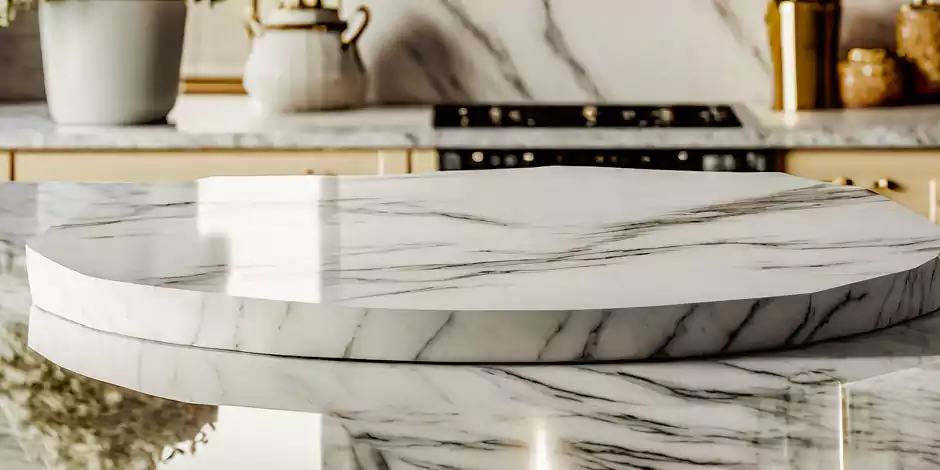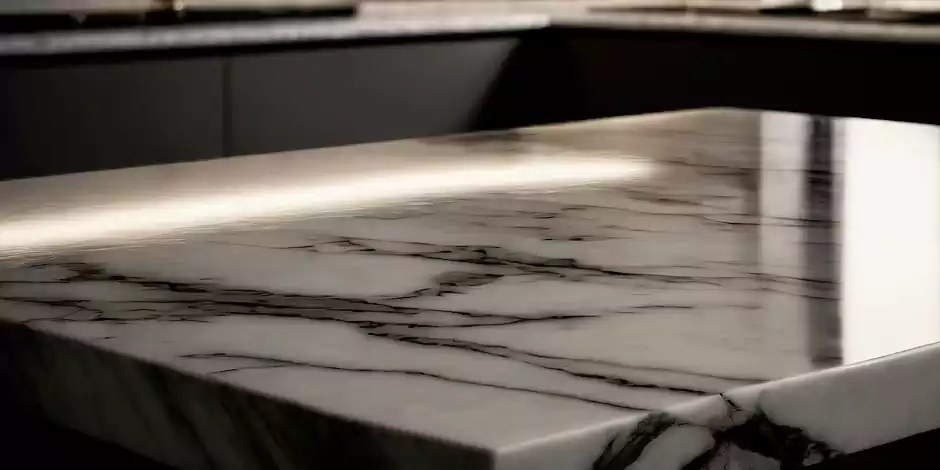
Can Honing Minimize Etching on a Marble Countertop in Pennsylvania?
Marble countertops are a popular choice among homeowners in Philadelphia, Montgomery County, Bucks County, and Chester County because of its well-known beauty and sophistication. Marble countertops are beautiful, but they may get etched easily, which over time can take away from their beauty. When acidic materials, such vinegar or lemon juice, come into contact with the marble surface, etching takes place. This chemical reaction produces dull, light-colored markings.
A common procedure recommended by many professionals is sharpening your marble countertop to prevent etching and preserve its immaculate appearance. Is etching really lessened by honing a marble countertop, though? Let’s investigate further to find out.
Understanding the Honing Process
Abrasives are used in the honing process to remove the marble’s top layer, leaving the surface smooth and matte. Honing produces a more subtle and natural surface than polishing, which gives an appearance of gloss. Since honing combines the surface and lessens the presence of any lines or scratches, it helps to reduce the visibility of etching.
Benefits of Honing a Marble Countertop
Honing a marble countertop has a number of advantages, including:
- Reduced Visibility of Etching
The honing procedure leaves the surface with a uniform, matte texture, which helps to hide etching. By doing this, the etched areas’ contrast with the countertop’s surrounding surface is reduced, which lessens the visibility of the marks. - Enhanced Durability
The marble’s top layer, which could include flaws, scratches, or other small faults, is removed during honing. The countertop becomes stronger and less prone to additional damage after this layer is removed. - Easier Maintenance
When compared to polished marble, honing makes the stone less likely to exhibit water stains, fingerprints, or smudges, making it simpler to clean and maintain. Particularly useful in high-traffic areas like restrooms and kitchens. - Timeless and Elegant Aesthetic
A multitude of interior design styles can be complemented by the classic and refined appearance of polished marble worktops. The natural aspect of the matte surface is enhanced with sophistication, making it both aesthetically pleasing and adaptable.
Note that honing does not completely remove etching, even though it can make it less noticeable. By minimizing the contrast between etched and non-etched areas and producing a more uniform surface, honing serves to lessen the effect of etching. Still, it’s a good idea to take care not to come into contact with anything acidic and to mop up spills right once to avoid etching. Honing is a useful method for making etching on marble countertops less noticeable. Honing reduces the contrast between etched and non-etched parts and brings about a consistent matte finish, which in turn lessens the visibility of any markings or scratches. It’s crucial to keep in mind that honing does not completely remove etching; therefore, regular upkeep and care are still required to preserve the elegance and durability of your marble countertop.
We at Tri-State Marble Countertop Care Service know how important it is to keep your marble countertops looking beautiful and lasting. Our team of expert artisans offers top-notch honed countertop repair and restoration services to the people of Philadelphia, Montgomery County, Bucks County, and Chester County. For professional assistance and guidance in maintaining a gorgeous and long-lasting marble countertop, get in touch with us right now.

Pros and Cons of Honing a Marble Countertop
Many homeowners choose to use a marble countertop because of its special advantages and attractive appearance. It does, however, have a unique set of drawbacks, just like every choice for home remodeling. Below is a thorough analysis of the benefits and drawbacks of polishing a marble countertop:
Pros
- Reduced Visibility of Etching and Scratches
- Benefit: Honed marble’s matte finish reduces the visibility of etching and scratches. This is due to the absence of luster, which blurs any flaws.
- Elegant, Matte Finish
- Benefit: Honed marble has a classy, subtle appearance that goes well with many different types of home design. Any environment is made more timeless and traditional by the matte finish.
- Enhanced Durability
- Benefit: The marble’s top layer, which may have surface damage and small defects, is removed during the honing process, which increases durability. By doing this, the countertop may be more resistant to deterioration in the future.
- Less Prone to Showing Water Spots and Fingerprints
- Benefit: Honed marble does not reveal smudges, fingerprints, or water marks as readily as polished marble does. This facilitates keeping everything looking neat and organized, particularly in high-traffic areas like restrooms and kitchens.
- Slip Resistance
- Benefit: Honed marble’s matte surface is less slick than polished marble’s, which can be a safety benefit in locations where spills or wetness are common.
Cons
- Increased Porosity
- Drawback: Honed marble has a higher porosity than polished marble, which makes it potentially more stain resistant. For the surface to be shielded from spills and stains, regular sealing is necessary.
- Maintenance Requirements
- Drawback: Although polished marble is simpler to maintain everyday, staining and other damage must be avoided with regular maintenance, which includes resealing.
- Higher Cost
- Drawback: Compared to polishing, honing can be a more labor- and time-intensive procedure, which could increase costs. It’s also important to take ongoing maintenance expenses into account.
- Less Reflective Surface
- Drawback: Honed marble might not be the best option for you if you’re looking for a glossy, reflecting surface. The overall brightness of a space might be impacted by the matte finish’s inferior light reflection compared to polished marble.
- Potential for Acid Etching
- Drawback: Although the matte surface can make etching less noticeable, honed marble is still susceptible to acid etching from things like vinegar, lemon juice, and other acidic elements. To stop damage, spills must be cleaned up right away.
A marble countertop that has been polished can offer a stunning, robust, and sophisticated surface that improves the appearance of your house. Weighing the advantages against any potential disadvantages is crucial, though. To keep polished marble worktops in excellent shape, regular upkeep and care are essential. For marble countertops, honing can be a great option if you appreciate a refined, low-gloss surface and are prepared to put in the required maintenance.
Contact Tri-State Marble Countertop Care Service for skilled honing, repair, and restoration services as well as knowledgeable guidance. Our knowledgeable staff is available to assist you with maintaining the elegance and usefulness of your marble countertops, and we serve Philadelphia, Montgomery County, Bucks County, and Chester County.

0 comments